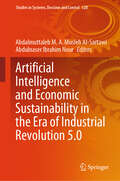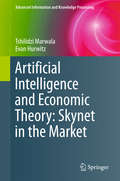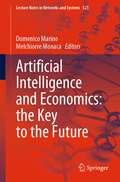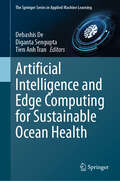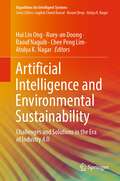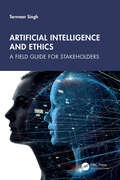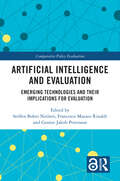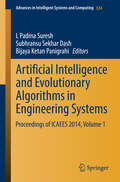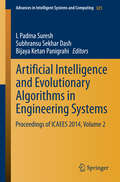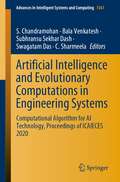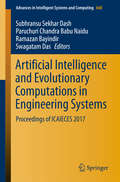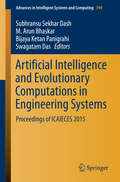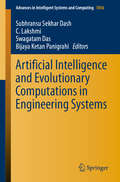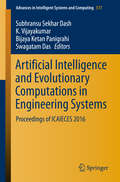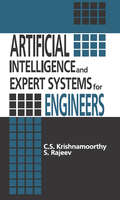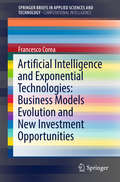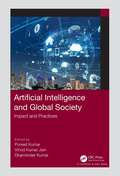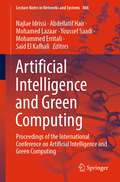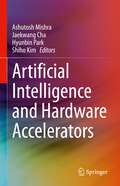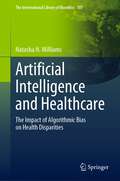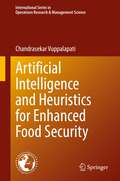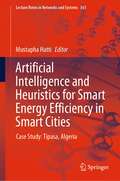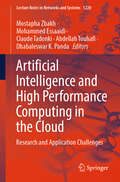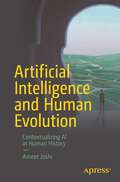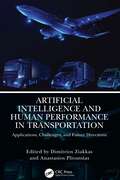- Table View
- List View
Artificial Intelligence and Economic Sustainability in the Era of Industrial Revolution 5.0 (Studies in Systems, Decision and Control #528)
by Abdalmuttaleb M. A. Musleh Al-Sartawi Abdulnaser Ibrahim NourIndustry 5.0 has been dubbed as the digital revolution with a soul. This book incorporates a wealth of research which integrates artificial intelligence (AI) with economic sustainability and Industry 5.0. It examines the human-centricity of the upcoming digital revolution and the role of sustainable technologies in enhancing the livelihoods of workers, individuals, communities, and eventually societies. It provides insight on important areas related to artificial intelligence, sustainable development, and society 5.0. The chapters present a wide range of topics including block cipher, entrepreneurship and AI, AI and stock trading decisions, digital transformation, knowledge management, chatbot engineering, cybersecurity, and smart metering system. This book is beneficial to scholars and academics who will find in it the knowledge of the support of AI and its contribution to economic sustainability, and solutions to enhance human-centricity and resilience.
Artificial Intelligence and Economic Theory: Skynet in the Market (Advanced Information and Knowledge Processing)
by Tshilidzi Marwala Evan HurwitzThis book theoretically and practically updates major economic ideas such as demand and supply, rational choice and expectations, bounded rationality, behavioral economics, information asymmetry, pricing, efficient market hypothesis, game theory, mechanism design, portfolio theory, causality and financial engineering in the age of significant advances in man-machine systems. The advent of artificial intelligence has changed many disciplines such as engineering, social science and economics. Artificial intelligence is a computational technique which is inspired by natural intelligence concepts such as the swarming of birds, the working of the brain and the pathfinding of the ants. Artificial Intelligence and Economic Theory: Skynet in the Market analyses the impact of artificial intelligence on economic theories, a subject that has not been studied. It also introduces new economic theories and these are rational counterfactuals and rational opportunity costs. These ideas are applied to diverse areas such as modelling of the stock market, credit scoring, HIV and interstate conflict. Artificial intelligence ideas used in this book include neural networks, particle swarm optimization, simulated annealing, fuzzy logic and genetic algorithms. It, furthermore, explores ideas in causality including Granger as well as the Pearl causality models.
Artificial Intelligence and Economics: the Key to the Future (Lecture Notes in Networks and Systems #523)
by Domenico Marino Melchiorre MonacaThis book aims to deal with the main advances in the study of artificial intelligence, the digital and circular economy and innovation from a multidisciplinary perspective. Whoever governs the artificial intelligence will hold the keys to the world and the future. This consideration explains the growing role of artificial intelligence in our lives and the need to understand its mechanisms.This book presents original research articles addressing various aspects of artificial intelligence applied to economics, law, management, and optimization. The topics discussed include, economics, territorial policies, law, resource allocation strategies, information technology, and learning for inclusion.Combining the input of contributing professors and researchers from Italian and other foreign universities, the book is of interest to students, researchers, and practitioners, as well as members of the public in general, interested in the world of the artificial intelligence and economics.
Artificial Intelligence and Edge Computing for Sustainable Ocean Health (The Springer Series in Applied Machine Learning)
by Debashis De Diganta Sengupta Tien Anh TranArtificial Intelligence and Edge Computing for Sustainable Ocean Health explores the transformative role of AI and edge computing in preserving and enhancing ocean health. The growing influence of Artificial Intelligence (AI), along with the Internet of Things (IoT) in generating wide coverage of sensor networks, and Edge Computing (EC) has paved the way for investigation of underwater as well as massive marine data, thereby generating huge potential for credible research opportunities for these domains. This book’s journey begins with a broad overview of Artificial Intelligence for Sustainable Ocean Health, setting the foundation for understanding AI's potential in marine conservation. The subsequent chapter, Role of Artificial Intelligence and Technologies in Improving Ocean Health in Promoting Tourism, illustrates the synergy between technological advancements and sustainable tourism practices, demonstrating how AI can enhance the attractiveness and preservation of marine destinations. The identification, restoration, and monitoring of marine resources along with the utilization of technology continues in Utilization of Underwater Wireless Sensor Network through Supervising a Random Network Environment in the Ocean Environment has been extensively dealt with. The technical challenges of underwater imaging, essential for accurate data collection and analysis has been discussed. The importance of Explainable AI is discussed in chapters like Sustainable Development Goal 14: Explainable AI (XAI) for Ocean Health, Explainable AI (XAI) for Ocean Health: Exploring the Role of Explainable AI in Enhancing Ocean Health, and A Comprehensive Study of AI (XAI) for Ocean Health Monitoring, which emphasize transparency and trust in AI systems. Further, Revolutionizing Internet of Underwater Things with Federated Learning, Underwater Drone, Underwater Imagery with AI/ML and IoT in ROV Technology and Ocean Cleanup has been demonstrated using innovative approaches to addressing underwater challenges. The book also includes a Review on the Optics and Photonics in Environmental Sustainability, focusing on the role of optics in marine conservation. Security issues are tackled in Intelligent Hash Function Based Key-Exchange Scheme for Ocean Underwater Data Transmission, and the overarching potential of AI in marine resource management is discussed in Artificial Intelligence as Key-enabler for Safeguarding the Marine Resources.
Artificial Intelligence and Environmental Sustainability: Challenges and Solutions in the Era of Industry 4.0 (Algorithms for Intelligent Systems)
by Hui Lin Ong Ruey-An Doong Raouf Naguib Chee Peng Lim Atulya K. NagarThe book discusses comprehensive and cutting-edge research and development endeavors, as well as innovative solutions, in implementing AI and related technologies to meet and undertake current and future challenges towards ensuring environmental sustainability. It explores the future research directions in the era of Industry 4.0. In the beginning, an overview of the utilization of Al for environmental sustainability is provided. The remaining chapters of the book cover the technological and application aspects of Al for environmental sustainability with illustrative examples. Finally, challenges with respect to deploying Al to solving environmental problems and the future trends are covered.
Artificial Intelligence and Ethics: A Field Guide for Stakeholders
by Tarnveer SinghArtificial Intelligence and Ethics is a general and wide-ranging survey of the benefits and ethical dilemmas of artificial intelligence (AI). The rise of AI and super-intelligent AI has created an urgent need to understand the many and varied ethical issues surrounding the technologies and applications of AI. This book lays a path towards the benefits and away from potential risks. It includes over thirty short chapters covering the widest array of topics from generative AI to superintelligence, from regulation to transparency, and from cybersecurity to risk management. Written by an award-winning Chief Information Security Officer (CISO) and experienced Technology Leader with two decades of industry experience, the book includes real-life examples and up-to-date references. The book will be of particular interest to business stakeholders, including executives, scientists, ethicists and policymakers, considering the complexities of AI and how to navigate these.
Artificial Intelligence and Evaluation: Emerging Technologies and Their Implications for Evaluation (Comparative Policy Evaluation)
by Steffen Bohni Nielsen, Francesco Mazzeo Rinaldi and Gustav Jakob PeterssonArtificial Intelligence and Evaluation: Emerging Technologies and Their Implications for Evaluation is a groundbreaking exploration of how the landscape of program evaluation will be redefined by artificial intelligence and other emerging digital technologies.In an era where digital technologies and artificial intelligence (AI) are rapidly evolving, this book presents a pivotal resource for evaluators navigating the transformative intersection of their practice and cutting-edge technology. Addressing the dual dimensions of how evaluations are conducted and what is evaluated, a roster of distinguished contributors illuminate the impact of AI on program evaluation methodologies. Offering a discerning overview of various digital technologies, their promises and perils, they carefully dissect the implications for evaluative processes and debate how evaluators must be equipped with the requisite skills to harness the full potential of AI tools. Further, the book includes a number of compelling use cases, demonstrating the tangible applications of AI in diverse evaluation scenarios. The use cases range from the application of GIS data to advanced text analytics. As such, this book provides evaluators with inspirational cases on how to apply AI in their practice as well as what pitfalls one must look out for.Artificial Intelligence and Evaluation is an indispensable guide for evaluators seeking to not only adapt to but thrive in the dynamic landscape of evaluation practices reshaped by the advent of artificial intelligence.The Open Access version of this book, available at http://www.taylorfrancis.com, has been made available under a Creative Commons Attribution-Non Commercial-No Derivatives 4.0 license.
Artificial Intelligence and Evolutionary Algorithms in Engineering Systems: Proceedings of ICAEES 2014, Volume 1 (Advances in Intelligent Systems and Computing #324)
by Bijaya Ketan Panigrahi L. Padma Suresh Subhransu Sekhar DashThe book is a collection of high-quality peer-reviewed research papers presented in Proceedings of International Conference on Artificial Intelligence and Evolutionary Algorithms in Engineering Systems (ICAEES 2014) held at Noorul Islam Centre for Higher Education, Kumaracoil, India. These research papers provide the latest developments in the broad area of use of artificial intelligence and evolutionary algorithms in engineering systems. The book discusses wide variety of industrial, engineering and scientific applications of the emerging techniques. It presents invited papers from the inventors/originators of new applications and advanced technologies.
Artificial Intelligence and Evolutionary Algorithms in Engineering Systems: Proceedings of ICAEES 2014, Volume 2 (Advances in Intelligent Systems and Computing #325)
by Bijaya Ketan Panigrahi L. Padma Suresh Subhransu Sekhar DashThe book is a collection of high-quality peer-reviewed research papers presented in Proceedings of International Conference on Artificial Intelligence and Evolutionary Algorithms in Engineering Systems (ICAEES 2014) held at Noorul Islam Centre for Higher Education, Kumaracoil, India. These research papers provide the latest developments in the broad area of use of artificial intelligence and evolutionary algorithms in engineering systems. The book discusses wide variety of industrial, engineering and scientific applications of the emerging techniques. It presents invited papers from the inventors/originators of new applications and advanced technologies.
Artificial Intelligence and Evolutionary Computations in Engineering Systems: Computational Algorithm for AI Technology, Proceedings of ICAIECES 2020 (Advances in Intelligent Systems and Computing #1361)
by S. Chandramohan Bala Venkatesh Subhransu Sekhar Dash Swagatam Das C. SharmeelaThis book gathers selected papers presented at the 6th International Conference on Artificial Intelligence and Evolutionary Computations in Engineering Systems, held at the Anna University, Chennai, India, from 20 to 22 April 2020. It covers advances and recent developments in various computational intelligence techniques, with an emphasis on the design of communication systems. In addition, it shares valuable insights into advanced computational methodologies such as neural networks, fuzzy systems, evolutionary algorithms, hybrid intelligent systems, uncertain reasoning techniques, and other machine learning methods and their application to decision-making and problem-solving in mobile and wireless communication networks.
Artificial Intelligence and Evolutionary Computations in Engineering Systems: Proceedings Of ICAIECES 2017 (Advances In Intelligent Systems And Computing #668)
by Swagatam Das Subhransu Sekhar Dash Paruchuri Chandra Babu Naidu Ramazan BayindirComprises contributions by the research scholars and academicians across the globe.<p><p> The book is a collection of high-quality peer-reviewed research papers presented in the International Conference on Artificial Intelligence and Evolutionary Computations in Engineering Systems (ICAIECES 2017). The book discusses wide variety of industrial, engineering and scientific applications of the emerging techniques. Researchers from academia and industry have presented their original work and ideas, information, techniques and applications in the field of communication, computing and power technologies.
Artificial Intelligence and Evolutionary Computations in Engineering Systems: Proceedings of ICAIECES 2015 (Advances in Intelligent Systems and Computing #394)
by Bijaya Ketan Panigrahi Swagatam Das Subhransu Sekhar Dash M. Arun BhaskarThe book is a collection of high-quality peer-reviewed research papers presented in the first International Conference on International Conference on Artificial Intelligence and Evolutionary Computations in Engineering Systems (ICAIECES -2015) held at Velammal Engineering College (VEC), Chennai, India during 22 - 23 April 2015. The book discusses wide variety of industrial, engineering and scientific applications of the emerging techniques. Researchers from academic and industry present their original work and exchange ideas, information, techniques and applications in the field of Communication, Computing and Power Technologies.
Artificial Intelligence and Evolutionary Computations in Engineering Systems: Proceedings Of Icaieces 2015 (Advances in Intelligent Systems and Computing #1056)
by Bijaya Ketan Panigrahi Swagatam Das Subhransu Sekhar Dash C. LakshmiThis book gathers selected papers presented at the 4th International Conference on Artificial Intelligence and Evolutionary Computations in Engineering Systems, held at the SRM Institute of Science and Technology, Kattankulathur, Chennai, India, from 11 to 13 April 2019. It covers advances and recent developments in various computational intelligence techniques, with an emphasis on the design of communication systems. In addition, it shares valuable insights into advanced computational methodologies such as neural networks, fuzzy systems, evolutionary algorithms, hybrid intelligent systems, uncertain reasoning techniques, and other machine learning methods and their application to decision-making and problem-solving in mobile and wireless communication networks.
Artificial Intelligence and Evolutionary Computations in Engineering Systems: Proceedings of ICAIECES 2016 (Advances in Intelligent Systems and Computing #517)
by Bijaya Ketan Panigrahi Swagatam Das Subhransu Sekhar Dash K. VijayakumarThe volume is a collection of high-quality peer-reviewed research papers presented in the International Conference on Artificial Intelligence and Evolutionary Computation in Engineering Systems (ICAIECES 2016) held at SRM University, Chennai, Tamilnadu, India. This conference is an international forum for industry professionals and researchers to deliberate and state their research findings, discuss the latest advancements and explore the future directions in the emerging areas of engineering and technology. The book presents original work and novel ideas, information, techniques and applications in the field of communication, computing and power technologies.
Artificial Intelligence and Expert Systems for Engineers (New Directions in Civil Engineering #11)
by C. S. Krishnamoorthy S. RajeevThis book provides a comprehensive presentation of artificial intelligence (AI) methodologies and tools valuable for solving a wide spectrum of engineering problems. What's more, it offers these AI tools on an accompanying disk with easy-to-use software. Artificial Intelligence and Expert Systems for Engineers details the AI-based methodologies known as: Knowledge-Based Expert Systems (KBES); Design Synthesis; Design Critiquing; and Case-Based Reasoning. KBES are the most popular AI-based tools and have been successfully applied to planning, diagnosis, classification, monitoring, and design problems. Case studies are provided with problems in engineering design for better understanding of the problem-solving models using the four methodologies in an integrated software environment. Throughout the book, examples are given so that students and engineers can acquire skills in the use of AI-based methodologies for application to practical problems ranging from diagnosis to planning, design, and construction and manufacturing in various disciplines of engineering.Artificial Intelligence and Expert Systems for Engineers is a must-have reference for students, teachers, research scholars, and professionals working in the area of civil engineering design in particular and engineering design in general.
Artificial Intelligence and Exponential Technologies: Business Models Evolution and New Investment Opportunities (SpringerBriefs in Applied Sciences and Technology)
by Francesco CoreaArtificial Intelligence is a huge breakthrough technology that is changing our world. It requires some degrees of technical skills to be developed and understood, so in this book we are going to first of all define AI and categorize it with a non-technical language. We will explain how we reached this phase and what historically happened to artificial intelligence in the last century. Recent advancements in machine learning, neuroscience, and artificial intelligence technology will be addressed, and new business models introduced for and by artificial intelligence research will be analyzed. Finally, we will describe the investment landscape, through the quite comprehensive study of almost 14,000 AI companies and we will discuss important features and characteristics of both AI investors as well as investments. This is the "Internet of Thinks" era. AI is revolutionizing the world we live in. It is augmenting the human experiences, and it targets to amplify human intelligence in a future not so distant from today. Although AI can change our lives, it comes also with some responsibilities. We need to start thinking about how to properly design an AI engine for specific purposes, as well as how to control it (and perhaps switch it off if needed). And above all, we need to start trusting our technology, and its ability to reach an effective and smart decision.
Artificial Intelligence and Global Society: Impact and Practices
by Puneet KumarIn the constant battle between human intelligence and machine intelligence, machines are close to surpassing human intelligence. The unrestrained use of digital technologies in automating processes is one of the prime advantages of the third industrial revolution. As a result, all developed and developing nations have started to digitalize mundane tasks. Thus, digital technologies for information and communication technologies (ICT) have achieved high market space in terms of infrastructure building, employment generation, education sector reforms, funds mobilization, electronic governance, hardware manufacturing, software development, etc. Hence, it is evident that every segment of society has been penetrated by ICT or digitalization. This book attempts to spotlight areas where AI is thriving. FEATURES Impact of digitalization and AI on governance Novel AI practices being followed across the global community in security, healthcare, crime prevention and detection, education, agriculture, sensor networks, etc. Innovative techniques that can be adopted to ensure better quality and better delivery of services to the society Avenues for further research by the research community and student fraternity This book is a guide for university students (especially those from technical backgrounds), industries, NGOs, and policy makers.
Artificial Intelligence and Green Computing: Proceedings of the International Conference on Artificial Intelligence and Green Computing (Lecture Notes in Networks and Systems #806)
by Najlae Idrissi Abdellatif Hair Mohamed Lazaar Youssef Saadi Mohammed Erritali Said El KafhaliThe main objective of this book is to explore the synergy between cutting-edge AI technologies and environmentally conscious practices through collecting best selected research papers presented at the International Conference on Artificial Intelligence and Green Computing (ICAIGC 2023), which took place from March 15 to 17, 2023, in Beni Mellal, Morocco. Within the pages of this book, readers find a wealth of research findings, survey works, and practical experiences aimed at fostering a comprehensive understanding of the pivotal role AI plays in various fields, including agriculture, health care, IT, and more. It highlights both the opportunities presented by the widespread usage of AI and the challenges associated with its continued advancement. As a result, the book has been divided into three parts: 1)- AI for multimedia processing, 2)- AI for distributed computing, and 3)- AI applications. The book serves as a comprehensive resource that brings together on-going research and practical experiences from the ICAIGC 2023 conference. It strives to deepen the understanding of the essential role AI plays in multiple fields. Whether you are an AI enthusiast, researcher, or practitioner, the insights contained within these pages expand your horizons and inspire further exploration of AI's potential in shaping a greener and more technologically advanced future.
Artificial Intelligence and Hardware Accelerators
by Ashutosh Mishra Jaekwang Cha Hyunbin Park Shiho KimThis book explores new methods, architectures, tools, and algorithms for Artificial Intelligence Hardware Accelerators. The authors have structured the material to simplify readers’ journey toward understanding the aspects of designing hardware accelerators, complex AI algorithms, and their computational requirements, along with the multifaceted applications. Coverage focuses broadly on the hardware aspects of training, inference, mobile devices, and autonomous vehicles (AVs) based AI accelerators
Artificial Intelligence and Healthcare: The Impact of Algorithmic Bias on Health Disparities (The International Library of Bioethics #107)
by Natasha H. WilliamsThis book explores the ethical problems of algorithmic bias and its potential impact on populations that experience health disparities by examining the historical underpinnings of explicit and implicit bias, the influence of the social determinants of health, and the inclusion of racial and ethnic minorities in data. Over the last twenty-five years, the diagnosis and treatment of disease have advanced at breakneck speeds. Currently, we have technologies that have revolutionized the practice of medicine, such as telemedicine, precision medicine, big data, and AI. These technologies, especially AI, promise to improve the quality of patient care, lower health care costs, improve patient treatment outcomes, and decrease patient mortality. AI may also be a tool that reduces health disparities; however, algorithmic bias may impede its success. This book explores the risks of using AI in the context of health disparities. It is of interest to health services researchers, ethicists, policy analysts, social scientists, health disparities researchers, and AI policy makers.
Artificial Intelligence and Heuristics for Enhanced Food Security (International Series in Operations Research & Management Science #331)
by Chandrasekar VuppalapatiThis book introduces readers to advanced data science techniques for signal mining in connection with agriculture. It shows how to apply heuristic modeling to improve farm-level efficiency, and how to use sensors and data intelligence to provide closed-loop feedback, while also providing recommendation techniques that yield actionable insights. The book also proposes certain macroeconomic pricing models, which data-mine macroeconomic signals and the influence of global economic trends on small-farm sustainability to provide actionable insights to farmers, helping them avoid financial disasters due to recurrent economic crises. The book is intended to equip current and future software engineering teams and operations research experts with the skills and tools they need in order to fully utilize advanced data science, artificial intelligence, heuristics, and economic models to develop software capabilities that help to achieve sustained food security for future generations.
Artificial Intelligence and Heuristics for Smart Energy Efficiency in Smart Cities: Case Study: Tipasa, Algeria (Lecture Notes in Networks and Systems #361)
by Mustapha HattiThis book emphasizes the role of micro-grid systems and connected networks for the strategic storage of energy through the use of information and communication techniques, big data, the cloud, and meta-heuristics to support the greed for artificial intelligence techniques in data and the implementation of global strategies to meet the challenges of the city in the broad sense. The intelligent management of renewable energy in the context of the energy transition requires the use of techniques and tools based on artificial intelligence (AI) to overcome the challenges of the intermittence of resources and the cost of energy. The advent of the smart city makes an increased call for the integration of artificial intelligence and heuristics to meet the challenge of the increasing migration of populations to the city, in order to ensure food, energy, and environmental security of the citizen of the city and his well-being. This book is intended for policymakers, academics, practitioners, and students. Several real cases are exposed throughout the book to illustrate the concepts and methods of the networks and systems presented. This book proposes the development of new technological innovations—mainly ICT—the concept of “Smart City” appears as a means of achieving more efficient and sustainable cities. The overall goal of the book is to develop a comprehensive framework to help public and private stakeholders make informed decisions on smart city investment strategies and develop skills for assessment and prioritization, including resolution of difficulties with deployment and reproducibility.
Artificial Intelligence and High Performance Computing in the Cloud: Research and Application Challenges (Lecture Notes in Networks and Systems #1220)
by Mostapha Zbakh Mohammed Essaaidi Claude Tadonki Abdellah Touhafi Dhabaleswar K. PandaHigh-performance computing as significantly evolves during the last two decades with the advent and consideration of multicores configurations and general-purpose GPUs. In the same time but more recently, artificial intelligence has gained a serious popularity and is considered in a broad range of applications. Cutting-edge AI, which typically involving large models and huge volume of training datasets, cannot be considered without the support of HPC infrastructures and techniques. Cloud computing is the most affordable way to leverage the power of HPC systems. As collection of valuable inputs from high-standard scientists, “Artificial Intelligence and High-Performance Computing in the Cloud: Upcoming” is certainly a book that should be given a serious consideration.
Artificial Intelligence and Human Evolution: Contextualizing AI in Human History
by Ameet JoshiThis book explores, from a high level, the parallels between the evolution of humans and the evolution of machines. The book reviews practical questions about the future of AI but also engages in philosophical discussions about what machine intelligence could mean for the human experience.The book focuses on what is intelligence and what separates intelligent species from non-so-intelligent ones. It concludes this section with the description of true nature of humanintelligence can be. We discuss how we looked at machines few hundred years back and how their definition and the expectations from them has changed over time. We will consider when and how machines became intelligent and then explore in depth he latest developments in artificial intelligence with explanation of deep learning technology and humanlike chat interface provided with products like ChatGPT. We will define both human intelligence and artificial intelligence and the distinction between the two.In the third and final section of the book, we will focus on near- and longer-term futures with widespread use of machine intelligence, making the whole ambient environment that we will live in intelligent How is this going to change human lives, and what parts of human life will be encroached with machines and their intelligence? We will explore how the job market will look with some jobs being taken by machines, and if this is overall a positive or negative change. What You Will LearnHow human intelligence is connected with artificial intelligence as well as the differencesHow AI is going to change our lives in the coming years, decades and centuriesAn explanation of deep learning technology and humanlike chat interface provided with products like ChatGPTWho This Book is ForReaders looking to contextualize the evolution of artificial intelligence in human history
Artificial Intelligence and Human Performance in Transportation: Applications, Challenges, and Future Directions
by Dimitrios Ziakkas Anastasios PlioutsiasArtificial Intelligence (AI) is a major technological advancement in the 21st century. With its influence spreading to all aspects of our lives and the engineering sector, establishing well-defined objectives is crucial for successfully integrating AI in the field of transportation. This book presents different ways of adopting emerging technologies in transportation operations, including security, safety, online training, and autonomous vehicle operations on land, sea, and air.This guide is a dynamic resource for senior management and decision-makers, with essential practical advice distilled from the expertise of specialists in the field. It addresses the most critical issues facing transportation service providers in adopting AI and investigates the relationship between the human operator and the technology to navigate what is and is not feasible or impossible. Case studies of actual implementation provide context to common scenarios in the transportation sector.This book will serve the reader as the starting point for practical questions regarding the deployment and safety assurance of new and emergent technologies in the transportation domains. Artificial Intelligence and Human Performance in Transportation is a beneficial read for professionals in the fields of Human Factors, Engineering (Aviation, Maritime and Land), Logistics, Manufacturing, Accident Investigation and Safety, Cybersecurity and Human Resources.
